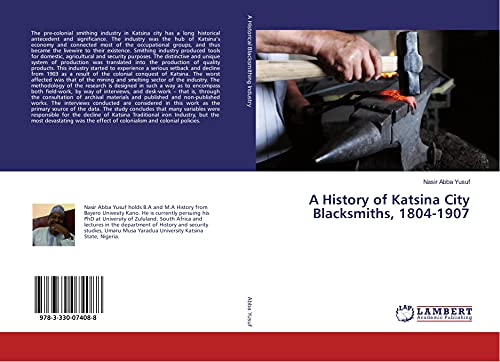A History of Katsina City Blacksmiths, 1804-1907
Nasir Abba Yusuf
BOOK REVIEW

In the vibrant tapestry of African history, the narrative of craftsmanship often gets eclipsed by grand political movements and monumental events. Yet, within the pages of A History of Katsina City Blacksmiths, 1804-1907 by Nasir Abba Yusuf, readers are invited into a world that pulsates with the rhythm of hammers on anvils and the incandescent glow of molten metal. This book isn't merely a historical account; it's a stirring homage to the artisans whose skills shaped the socio-economic landscape of Katsina City during a time of profound transformation.
As you delve into Yusuf's meticulous research, you're transported to an era where the blacksmiths of Katsina were not just tradesmen but pivotal players in the community's prosperity. Their artistry, honed over generations, contributed to the creation of tools and weapons that fueled the ambition of empires and the sustenance of daily life. The intimacy with which Yusuf narrates their stories evokes a sense of kinship with these craftsmen, allowing you to feel the sweat on their brows and hear the clanging of metal as they forged not just objects, but the very identity of their society.
Critics hail the work for its deep dive into the socio-cultural significance of blacksmithing in Katsina. The book paints a vivid picture against a backdrop of colonial encroachment and the bustling commerce of West Africa. The historical context isn't just an accessory to the craft; it's integral to understanding how these artisans navigated the complexities of change. Readers have commented on how Yusuf doesn't shy away from illustrating the challenges faced by these blacksmiths, including the shifting dynamics of trade and the influence of foreign colonial powers. This duality creates a fascinating tension-one that speaks to the broader struggles of African societies during a tumultuous period.
What truly sets Yusuf's work apart is its accessibility. While steeped in academic rigor, the prose is inviting, drawing both scholars and casual readers into its embrace. You can almost visualize the bustling markets of Katsina, hear the animated exchanges of tradespeople, and feel the pulse of a community intricately woven together by shared skills and traditions.
Yet, it's important to acknowledge the critiques that have emerged alongside the praise. Some readers argue that the narrative focuses too heavily on anecdotal evidence, at times straying from a more traditional academic analysis. However, this quality is precisely what makes the book compelling-its ability to humanize history, providing a voice to those often overlooked in historic discourse.
In reading A History of Katsina City Blacksmiths, you're not just learning about a craft; you're embarking on a journey that urges you to contemplate the resilience of culture amid adversity. The book resonates with a powerful message about the importance of preserving our histories. It's a clarion call for appreciation of the artisans whose labor is the backbone of societies, reminding us that every hammer strike is a testament to human ingenuity and spirit.
As the world wrestles with the erasures of history, Yusuf's work stands as a beacon of remembrance. It ignites a passionate reflection on cultural legacies-how they shape our narratives and influence our future. Will you allow yourself to step into this remarkable journey of craft, community, and resilience? The blacksmiths of Katsina await your discovery. 🌍✨️
📖 A History of Katsina City Blacksmiths, 1804-1907
✍ by Nasir Abba Yusuf
🧾 124 pages
2017
#history #katsina #city #blacksmiths #1804 #1907 #nasir #abba #yusuf #NasirAbbaYusuf